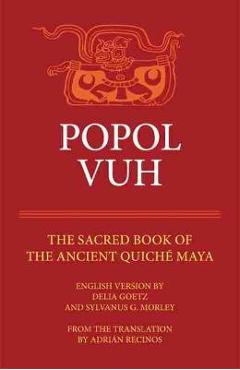Popol Vuh: The Sacred Book of the Ancient Quiche Maya - Adrien Recinos

Detalii Popol Vuh: The Sacred Book
libris.ro
122.48 Lei
136.09 Lei
History
Adrien Recinos
Popol Vuh: The Sacred Book - Disponibil la libris.ro
Pe YEO găsești Popol Vuh: The Sacred Book de la Adrien Recinos, în categoria History.
Indiferent de nevoile tale, Popol Vuh: The Sacred Book of the Ancient Quiche Maya - Adrien Recinos din categoria History îți poate aduce un echilibru perfect între calitate și preț, cu avantaje practice și moderne.
Preț: 122.48 Lei
Caracteristicile produsului Popol Vuh: The Sacred Book
Comandă Popol Vuh: The Sacred Book Online, Simplu și Rapid
Prin intermediul platformei YEO, poți comanda Popol Vuh: The Sacred Book de la libris.ro rapid și în siguranță. Bucură-te de o experiență de cumpărături online optimizată și descoperă cele mai bune oferte actualizate constant.
Descriere magazin:
This is the first complete version in English of the Book of the People of the Quiche Maya, the most powerful nation of the Guatemalan highlands in pre-Conquest times and a branch of the ancient Maya, whose remarkable civilization in pre-Columbian America is in many ways comparable to the ancient civilizations of the Mediterranean. Generally regarded as America\'s oldest book, the Popol Vuh, in fact, corresponds to our Christian Bible, and it is, moreover, the most important of the five pieces of the great library treasures of the Maya that survived the Spanish Conquest. The Popol Vuh was first transcribed in the Quiche language, -but in Latin characters, in the middle of the sixteenth century, by some unknown but highly literate Quiche Maya Indian-probably from the oral traditions of his people. This now lost manuscript was copied at the end of the seventeenth century by Father Francisco Xim nez, then parish priest of the village of Santo Tom s Chichicastenango in the highlands of Guatemala, today the most celebrated and best-known Indian town in all of Central America. The mythology, traditions, cosmogony, and history of the Quich Maya, including the chronology of their kings down to 1550, are related in simple yet literary style by the Indian chronicler. And Adrian Recinos has made a valuable contribution to the understanding and enjoyment of the document through his thorough going introduction and his identification of places and people in the footnotes.

Produse asemănătoare
Produse marca Adrien Recinos

Popol Vuh: The Sacred Book of the Ancient Quiche Maya - Adrien Recinos
![]() libris.ro
libris.ro
Actualizat in 28/10/2025
122.48 Lei